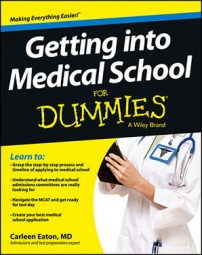One of the most critical elements of your medical school application is the personal statement. Your personal statement tells the medical school application committee who you are and what brought you to where you are now. In other words, your personal statement helps to distinguish you from other medical school applicants.
To craft the best personal statement, you need a systematic approach, especially in the early stages of writing, which includes brainstorming ideas and selecting a theme.
Brainstorm ideas for your medical school application’s personal statement
Even if you’ve wanted to be a physician from a very young age, you weren’t literally born knowing medicine was your life’s calling. At some point, you made the decision to pursue medicine. Why? What experiences led to this choice? What influences shaped you as a person? What makes you unique?
The writing process shouldn’t begin with your sitting down facing a blank screen to answer these questions in your first draft. Instead, the first step is to bring ideas and experiences to the forefront of your mind and jot them down over a period of days or even weeks.
Here are some additional questions designed to help you get the ideas flowing:
What attracts you to the medical profession?
How have your experiences contributed to your understanding of the qualities a physician needs?
What qualities do you possess that will make you a good physician? How did you develop these qualities?
Who have been your role models or mentors?
How have you explored the field of medicine?
What challenges have you faced in life?
Who or what has had an impact on you?
What do you excel at?
What is unique about you or your background?
If you were face to face with the admissions committee, what would you tell it?
Along with thinking generally about these topics, you need to produce specific anecdotes and examples to illustrate your points. For example, in response to the first question in the preceding list, your first thought may be that volunteering in the ICU your freshman year of college reinforced your budding interest in medicine.
Don’t stop there; instead, develop your idea in greater depth. What was the environment in the ICU like? What did you notice about the way the medical staff interacted with each other and with patients? What specific experiences did you have with patients or physicians? How did your perspective on medicine change as a result of the experience? What was the most memorable day you had on the unit? Why?
At this stage, don’t edit your ideas; simply jot them down. Some of your thoughts will make it into the final draft; many won’t. Start with plenty of material so that you can choose the items that most effectively tell your story. Brainstorming also helps you get back into the mode of writing and out of the memorizing-and-regurgitating approach you perfected to get through your premed classes.
Choose a theme for your medical school application’s personal statement
With your list of ideas and examples for inspiration, you’re ready to choose a theme for your statement. The best personal statements are those unified around a common theme. Read through the list of ideas you brainstormed. Which ones are most important? What’s the thread that ties them together?
A theme seemingly unrelated to medicine can be an excellent choice because it can set apart your essay from the sea of others that revolve around “I want to help people” or “I love science.” For example, you might notice that many of your experiences reflect a strong sense of independence and desire for adventure.
Maybe this attribute is rooted in growing up in a military family that moved around every few years, including overseas. You could build an essay around these ideas by describing how the characteristics you developed at an early age informed your later experiences and motivated your interest in medicine.
Even a single experience, such as the first time you watched a surgery in action or a patient who profoundly impacted you, can serve as a theme.
Themes are great, but don’t be too heavy-handed with the subject, or you may end up making the reader roll his eyes. Talking about playing the violin in the opening paragraph and then using each subsequent paragraph to compare medical specialties to different types of instruments is something even the strongest writer probably couldn’t pull off.
Skillfully handled, a theme is a framework for the essay that may recede into the background at times only to reemerge later.

